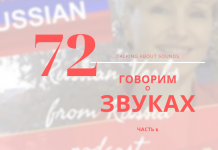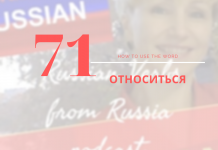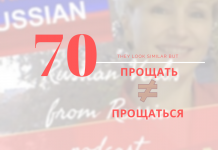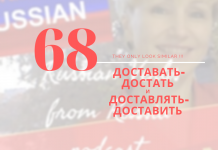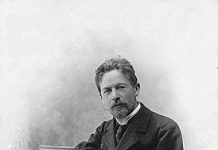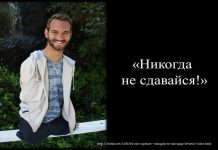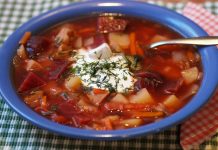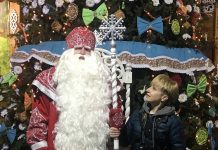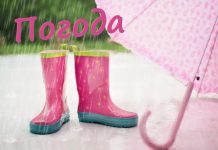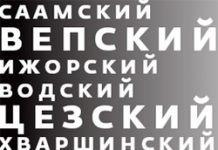Reading in Russian – Level С1: Ванька (a short story by Anton Chekhov)
Главный герой рассказа А.Чехова “Ванька” – крестьянский мальчик, которого отправили в город в ученики к сапожнику (shoemaker). Его жизнь в чужом доме очень-очень трудна. Ванька пишет письмо своему дедушке. Кроме дедушки, у него никого нет. Он описывает свою невыносимую жизнь (describes his unbearable life) и просит дедушку взять его назад в деревню.
| Ванька Жуков, девятилетний мальчик, отданный три месяца тому назад в ученье к сапожнику Аляхину, в ночь под Рождество не ложился спать. Дождавшись, когда хозяева и подмастерья ушли к заутрене, он достал из хозяйского шкапа пузырек с чернилами, ручку с заржавленным пером и, разложив перед собой измятый лист бумаги, стал писать. | NINE-YEAR-OLD Vanka Zhukov, who had been apprentice to the shoemaker Aliakhin for three months, did not go to bed the night before Christmas. He waited till the master and mistress and the assistants had gone out to an early church-service, to procure from his employer’s cupboard a small phial of ink and a penholder with a rusty nib; then, spreading a crumpled sheet of paper in front of him, he began to write. |
| Прежде чем вывести первую букву, он несколько раз пугливо оглянулся на двери и окна, покосился на темный образ, по обе стороны которого тянулись полки с колодками, и прерывисто вздохнул. Бумага лежала на скамье, а сам он стоял перед скамьей на коленях. | Before, however, deciding to make the first letter, he looked furtively at the door and at the window, glanced several times at the sombre ikon, on either side of which stretched shelves full of lasts, and heaved a heart-rending sigh. The sheet of paper was spread on a bench, and he himself was on his knees in front of it. |
| «Милый дедушка, Константин Макарыч! — писал он. — И пишу тебе письмо. Поздравляю вас с Рождеством и желаю тебе всего от господа бога. Нету у меня ни отца, ни маменьки, только ты у меня один остался». | “Dear Grandfather Konstantin Makarych,” he wrote, “I am writing you a letter. I wish you a Happy Christmas and all God’s holy best. I have no mamma or papa, you are all I have.” |
| Ванька перевел глаза на темное окно, в котором мелькало отражение его свечки, и живо вообразил себе своего деда Константина Макарыча, служащего ночным сторожем у господ Живаревых. Это маленький, тощенький, но необыкновенно юркий и подвижной старикашка лет 65-ти, с вечно смеющимся лицом и пьяными глазами. Днем он спит в людской кухне или балагурит с кухарками, ночью же, окутанный в просторный тулуп, ходит вокруг усадьбы и стучит в свою колотушку. За ним, опустив головы, шагают старая Каштанка и кобелек Вьюн, прозванный так за свой черный цвет и тело, длинное, как у ласки. Этот Вьюн необыкновенно почтителен и ласков, одинаково умильно смотрит как на своих, так и на чужих, но кредитом не пользуется. Под его почтительностью и смирением скрывается самое иезуитское ехидство. Никто лучше его не умеет вовремя подкрасться и цапнуть за ногу, забраться в ледник или украсть у мужика курицу. Ему уж не раз отбивали задние ноги, раза два его вешали, каждую неделю пороли до полусмерти, но он всегда оживал. | Vanka gave a look towards the window in which shone the reflection of his candle, and vividly pictured to himself his grandfather, Konstantin Makarych, who was night-watchman at Messrs. Zhivarev. He was a small, lean, unusually lively and active old man of sixty-five, always smiling and blear-eyed. All day he slept in the servants’ kitchen or trifled with the cooks. At night, enveloped in an ample sheep-skin coat, he strayed round the domain tapping with his cudgel. Behind him, each hanging its head, walked the old bitch Kashtanka, and the dog Viun, so named because of his black coat and long body and his resemblance to a loach. Viun was an unusually civil and friendly dog, looking as kindly at a stranger as at his masters, but he was not to be trusted. Beneath his deference and humbleness was hid the most inquisitorial maliciousness. No one knew better than he how to sneak up and take a bite at a leg, or slip into the larder or steal a muzhik’s chicken. More than once they had nearly broken his hind-legs, twice he had been hung up, every week he was nearly flogged to death, but he always recovered. |
| Теперь, наверно, дед стоит у ворот, щурит глаза на ярко-красные окна деревенской церкви и, притопывая валенками, балагурит с дворней. Колотушка его подвязана к поясу. Он всплескивает руками, пожимается от холода и, старчески хихикая, щиплет то горничную, то кухарку. — Табачку нешто нам понюхать? — говорит он, подставляя бабам свою табакерку. Бабы нюхают и чихают. Дед приходит в неописанный восторг, заливается веселым смехом и кричит: — Отдирай, примерзло! | At this moment, for certain, Vanka’s grandfather must be standing at the gate, blinking his eyes at the bright red windows of the village church, stamping his feet in their high-felt boots, and jesting with the people in the yard; his cudgel will be hanging from his belt, he will be hugging himself with cold, giving a little dry, old man’s cough, and at times pinching a servant-girl or a cook. “Won’t we take some snuff?” he asks, holding out his snuff-box to the women. The women take a pinch of snuff, and sneeze. The old man goes into indescribable ecstasies, breaks into loud laughter, and cries: “Off with it, it will freeze to your nose!” |
| Дают понюхать табаку и собакам. Каштанка чихает, крутит мордой и, обиженная, отходит в сторону. Вьюн же из почтительности не чихает и вертит хвостом. А погода великолепная. Воздух тих, прозрачен и свеж. Ночь темна, но видно всю деревню с ее белыми крышами и струйками дыма, идущими из труб, деревья, посребренные инеем, сугробы. Всё небо усыпано весело мигающими звездами, и Млечный путь вырисовывается так ясно, как будто его перед праздником помыли и потерли снегом… | He gives his snuff to the dogs, too. Kashtanka sneezes, twitches her nose, and walks away offended. Viun deferentially refuses to sniff and wags his tail. It is glorious weather, not a breath of wind, clear, and frosty; it is a dark night, but the whole village, its white roofs and streaks of smoke from the chimneys, the trees silvered with hoar-frost, and the snowdrifts, you can see it all. The sky scintillates with bright twinkling stars, and the Milky Way stands out so clearly that it looks as if it had been polished and rubbed over with snow for the holidays. . . . |
| Ванька вздохнул, умокнул перо и продолжал писать: «А вчерась мне была выволочка. Хозяин выволок меня за волосья на двор и отчесал шпандырем за то, что я качал ихнего ребятенка в люльке и по нечаянности заснул. А на неделе хозяйка велела мне почистить селедку, а я начал с хвоста, а она взяла селедку и ейной мордой начала меня в харю тыкать. Подмастерья надо мной насмехаются, посылают в кабак за водкой и велят красть у хозяев огурцы, а хозяин бьет чем попадя. А еды нету никакой. Утром дают хлеба, в обед каши и к вечеру тоже хлеба, а чтоб чаю или щей, то хозяева сами трескают. А спать мне велят в сенях, а когда ребятенок ихний плачет, я вовсе не сплю, а качаю люльку. Милый дедушка, сделай божецкую милость, возьми меня отсюда домой, на деревню, нету никакой моей возможности… Кланяюсь тебе в ножки и буду вечно бога молить, увези меня отсюда, а то помру…» | Vanka sighs, dips his pen in the ink, and continues to write: “Last night I got a thrashing, my master dragged me by my hair into the yard, and belaboured me with a shoe-maker’s stirrup, because, while I was rocking his brat in its cradle, I unfortunately fell asleep. And during the week my mistress told me to clean a herring, and I began by its tail, so she took the herring and stuck its snout into my face. The assistants tease me, send me to the tavern for vodka, make me steal the master’s cucumbers, and the master beats me with whatever is handy. Food there is none; in the morning it’s bread, at dinner gruel, and in the evening bread again. As for tea or sour-cabbage soup, the master and the mistress themselves guzzle that. They make me sleep in the vestibule, and when their brat cries, I don’t sleep at all, but have to rock the cradle. Dear Grandpapa, for Heaven’s sake, take me away from here, home to our village, I can’t bear this any more. . . . I bow to the ground to you, and will pray to God for ever and ever, take me from here or I shall die. . . .” |
| Ванька покривил рот, потер своим черным кулаком глаза и всхлипнул. «Я буду тебе табак тереть, — продолжал он, — богу молиться, а если что, то секи меня, как сидорову козу. А ежели думаешь, должности мне нету, то я Христа ради попрошусь к приказчику сапоги чистить, али заместо Федьки в подпаски пойду. Дедушка милый, нету никакой возможности, просто смерть одна. Хотел было пешком на деревню бежать, да сапогов нету, морозу боюсь. А когда вырасту большой, то за это самое буду тебя кормить и в обиду никому не дам, а помрешь, стану за упокой души молить, всё равно как за мамку Пелагею. | The corners of Vanka’s mouth went down, he rubbed his eyes with his dirty fist, and sobbed. “I’ll grate your tobacco for you,” he continued, “I’ll pray to God for you, and if there is anything wrong, then flog me like the grey goat. And if you really think I shan’t find work, then I’ll ask the manager, for Christ’s sake, to let me clean the boots, or I’ll go instead of Fedya as underherdsman. Dear Grandpapa, I can’t bear this any more, it’ll kill me. . . . I wanted to run away to our village, but I have no boots, and I was afraid of the frost, and when I grow up I’ll look after you, no one shall harm you, and when you die I’ll pray for the repose of your soul, just like I do for mamma Pelagueya. |
| А Москва город большой. Дома всё господские и лошадей много, а овец нету и собаки не злые. Со звездой тут ребята не ходят и на клирос петь никого не пущают, а раз я видал в одной лавке на окне крючки продаются прямо с леской и на всякую рыбу, очень стоющие, даже такой есть один крючок, что пудового сома удержит. И видал которые лавки, где ружья всякие на манер бариновых, так что небось рублей сто кажное… А в мясных лавках и тетерева, и рябцы, и зайцы, а в котором месте их стреляют, про то сидельцы не сказывают. Милый дедушка, а когда у господ будет елка с гостинцами, возьми мне золоченный орех и в зеленый сундучок спрячь. Попроси у барышни Ольги Игнатьевны, скажи, для Ваньки». | “As for Moscow, it is a large town, there are all gentlemen’s houses, lots of horses, no sheep, and the dogs are not vicious. The children don’t come round at Christmas with a star, no one is allowed to sing in the choir, and once I saw in a shop window hooks on a line and fishing rods, all for sale, and for every kind of fish, awfully convenient. And there was one hook which would catch a sheat-fish weighing a pound. And there are shops with guns, like the master’s, and I am sure they must cost 100 rubles each. And in the meat-shops there are woodcocks, partridges, and hares, but who shot them or where they come from, the shopman won’t say. “Dear Grandpapa, and when the masters give a Christmas tree, take a golden walnut and hide it in my green box. Ask the young lady, Olga Ignatyevna, for it, say it’s for Vanka.” |
| Ванька судорожно вздохнул и опять уставился на окно. Он вспомнил, что за елкой для господ всегда ходил в лес дед и брал с собою внука. Веселое было время! И дед крякал, и мороз крякал, а глядя на них, и Ванька крякал. Бывало, прежде чем вырубить елку, дед выкуривает трубку, долго нюхает табак, посмеивается над озябшим Ванюшкой… Молодые елки, окутанные инеем, стоят неподвижно и ждут, которой из них помирать? Откуда ни возьмись, по сугробам летит стрелой заяц… Дед не может чтоб не крикнуть: — Держи, держи… держи! Ах, куцый дьявол! | Vanka sighed convulsively, and again stared at the window. He remembered that his grandfather always went to the forest for the Christmas tree, and took his grandson with him. What happy times! The frost crackled, his grandfather crackled, and as they both did, Vanka did the same. Then before cutting down the Christmas tree his grandfather smoked his pipe, took a long pinch of snuff, and made fun of poor frozen little Vanka. . . . The young fir trees, wrapt in hoar-frost, stood motionless, waiting for which of them would die. Suddenly a hare springing from somewhere would dart over the snowdrift. . . . His grandfather could not help shouting: “Catch it, catch it, catch it! Ah, short-tailed devil!” |
| Срубленную елку дед тащил в господский дом, а там принимались убирать ее… Больше всех хлопотала барышня Ольга Игнатьевна, любимица Ваньки. Когда еще была жива Ванькина мать Пелагея и служила у господ в горничных, Ольга Игнатьевна кормила Ваньку леденцами и от нечего делать выучила его читать, писать, считать до ста и даже танцевать кадриль. Когда же Пелагея умерла, сироту Ваньку спровадили в людскую кухню к деду, а из кухни в Москву к сапожнику Аляхину… | When the tree was down, his grandfather dragged it to the master’s house, and there they set about decorating it. The young lady, Olga Ignatyevna, Vanka’s great friend, busied herself most about it. When little Vanka’s mother, Pelagueya, was still alive, and was servant-woman in the house, Olga Ignatyevna used to stuff him with sugar-candy, and, having nothing to do, taught him to read, write, count up to one hundred, and even to dance the quadrille. When Pelagueya died, they placed the orphan Vanka in the kitchen with his grandfather, and from the kitchen he was sent to Moscow to Aliakhin, the shoemaker. |
| «Приезжай, милый дедушка, — продолжал Ванька, — Христом богом тебя молю, возьми меня отседа. Пожалей ты меня сироту несчастную, а то меня все колотят и кушать страсть хочется, а скука такая, что и сказать нельзя, всё плачу. А намедни хозяин колодкой по голове ударил, так что упал и насилу очухался. Пропащая моя жизнь, хуже собаки всякой… А еще кланяюсь Алене, кривому Егорке и кучеру, а гармонию мою никому не отдавай. Остаюсь твой внук Иван Жуков, милый дедушка приезжай». | “Come quick, dear Grandpapa,” continued Vanka, “I beseech you for Christ’s sake take me from here. Have pity on a poor orphan, for here they beat me, and I am frightfully hungry, and so sad that I can’t tell you, I cry all the time. The other day the master hit me on the head with a last; I fell to the ground, and only just returned to life. My life is a misfortune, worse than any dog’s. . . . I send greetings to Aliona, to one-eyed Tegor, and the coachman, and don’t let any one have my mouth-organ. I remain, your grandson, Ivan Zhukov, dear Grandpapa, do come.” |
| Ванька свернул вчетверо исписанный лист и вложил его в конверт, купленный накануне за копейку… Подумав немного, он умокнул перо и написал адрес: На деревню дедушке. Потом почесался, подумал и прибавил: «Константину Макарычу». Довольный тем, что ему не помешали писать, он надел шапку и, не набрасывая на себя шубейки, прямо в рубахе выбежал на улицу… Сидельцы из мясной лавки, которых он расспрашивал накануне, сказали ему, что письма опускаются в почтовые ящики, а из ящиков развозятся по всей земле на почтовых тройках с пьяными ямщиками и звонкими колокольцами. Ванька добежал до первого почтового ящика и сунул драгоценное письмо в щель… Убаюканный сладкими надеждами, он час спустя крепко спал… Ему снилась печка. На печи сидит дед, свесив босые ноги, и читает письмо кухаркам… Около печи ходит Вьюн и вертит хвостом… | Vanka folded his sheet of paper in four, and put it into an envelope purchased the night before for a kopek. He thought a little, dipped the pen into the ink, and wrote the address: “The village, to my grandfather.” He then scratched his head, thought again, and added: “Konstantin Makarych.” Pleased at not having been interfered with in his writing, he put on his cap, and, without putting on his sheep-skin coat, ran out in his shirt-sleeves into the street. The shopman at the poulterer’s, from whom he had inquired the night before, had told him that letters were to be put into post-boxes, and from there they were conveyed over the whole earth in mail troikas by drunken post-boys and to the sound of bells. Vanka ran to the first post-box and slipped his precious letter into the slit. An hour afterwards, lulled by hope, he was sleeping soundly. In his dreams he saw a stove, by the stove his grandfather sitting with his legs dangling down, barefooted, and reading a letter to the cooks, and Viun walking round the stove wagging his tail. Best Russian Short Stories by Anton Chekhov, translated by Constance Garnett |
If you want to practice your reading skills even more, check this page.





